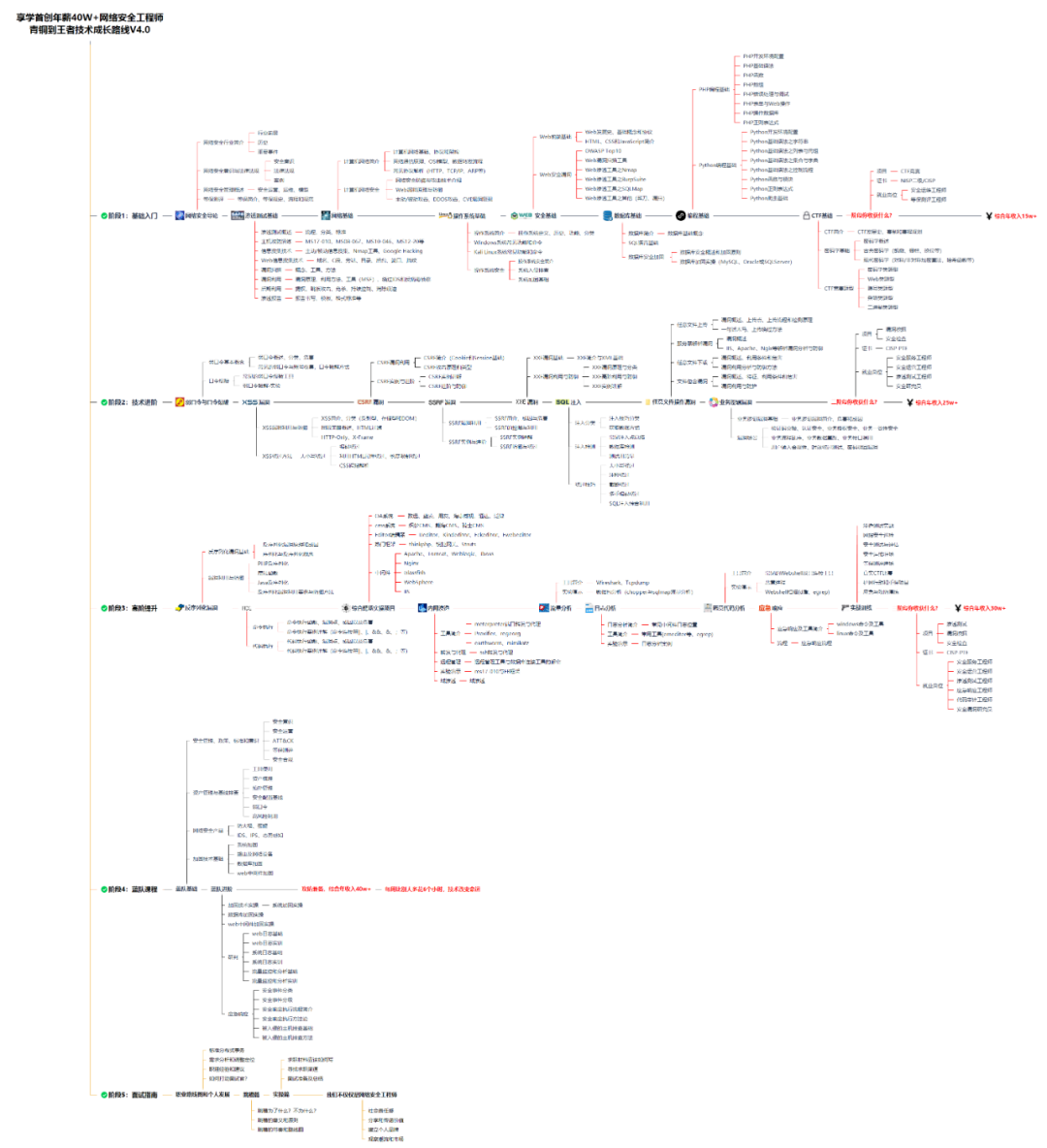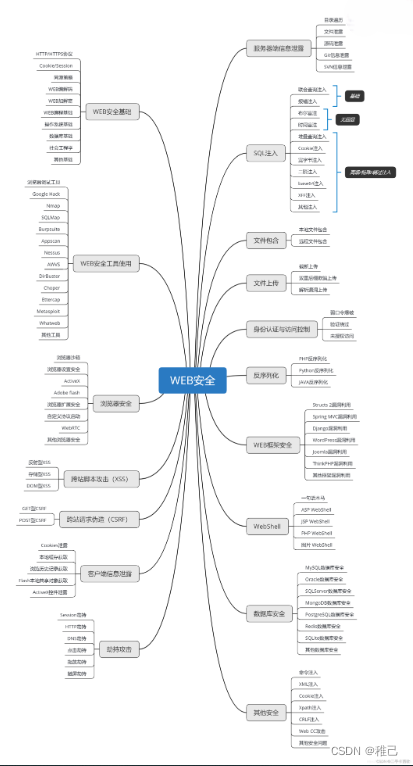给大家的福利
零基础入门
对于从来没有接触过网络安全的同学,我们帮你准备了详细的学习成长路线图。可以说是最科学最系统的学习路线,大家跟着这个大的方向学习准没问题。

同时每个成长路线对应的板块都有配套的视频提供:

因篇幅有限,仅展示部分资料
需要体系化学习资料的朋友,可以加我V获取:vip204888 (备注网络安全)
网上学习资料一大堆,但如果学到的知识不成体系,遇到问题时只是浅尝辄止,不再深入研究,那么很难做到真正的技术提升。
一个人可以走的很快,但一群人才能走的更远!不论你是正从事IT行业的老鸟或是对IT行业感兴趣的新人,都欢迎加入我们的的圈子(技术交流、学习资源、职场吐槽、大厂内推、面试辅导),让我们一起学习成长!
* 按照我们之前的 this 指向来判断,两个都应该指向 obj
* 但是 fun 因为是箭头函数,所以 this 不指向 obj,而是指向 fun 的外层,就是 window
* 箭头函数内部没有 arguments 这个参数集合
const obj = {
fn: function () {
console.log(arguments)
},
fun: () => {
console.log(arguments)
}
}
obj.fn(1, 2, 3) // 会打印一个伪数组 [1, 2, 3]
obj.fun(1, 2, 3) // 会直接报错
* 函数的行参只有一个的时候可以不写 () 其余情况必须写
const obj = {
fn: () => {
console.log(‘没有参数,必须写小括号’)
},
fn2: a => {
console.log(‘一个行参,可以不写小括号’)
},
fn3: (a, b) => {
console.log(‘两个或两个以上参数,必须写小括号’)
}
}
* 函数体只有一行代码的时候,可以不写 {} ,并且会自动 return
const obj = {
fn: a => {
return a + 10
},
fun: a => a + 10
}
console.log(fn(10)) // 20
console.log(fun(10)) // 20
#### **函数传递参数的时候的默认值**
* 我们在定义函数的时候,有的时候需要一个默认值出现
* 就是当我不传递参数的时候,使用默认值,传递参数了就使用传递的参数
function fn(a) {
a = a || 10
console.log(a)
}
fn() // 不传递参数的时候,函数内部的 a 就是 10
fn(20) // 传递了参数 20 的时候,函数内部的 a 就是 20
* 在 ES6 中我们可以直接把默认值写在函数的行参位置
function fn(a = 10) {
console.log(a)
}
fn() // 不传递参数的时候,函数内部的 a 就是 10
fn(20) // 传递了参数 20 的时候,函数内部的 a 就是 20
* 这个默认值的方式箭头函数也可以使用
const fn = (a = 10) => {
console.log(a)
}
fn() // 不传递参数的时候,函数内部的 a 就是 10
fn(20) // 传递了参数 20 的时候,函数内部的 a 就是 20
* 注意: **箭头函数如果你需要使用默认值的话,那么一个参数的时候也需要写 ()**
#### **解构赋值**
* 解构赋值,就是快速的从对象或者数组中取出成员的一个语法方式
#### **解构对象**
* 快速的从对象中获取成员
// ES5 的方法向得到对象中的成员
const obj = {
name: ‘Jack’,
age: 18,
gender: ‘男’
}
let name = obj.name
let age = obj.age
let gender = obj.gender
// 解构赋值的方式从对象中获取成员
const obj = {
name: ‘Jack’,
age: 18,
gender: ‘男’
}
// 前面的 {} 表示我要从 obj 这个对象中获取成员了
// name age gender 都得是 obj 中有的成员
// obj 必须是一个对象
let { name, age, gender } = obj
#### **解构数组**
* 快速的从数组中获取成员
// ES5 的方式从数组中获取成员
const arr = [‘Jack’, ‘Rose’, ‘Tom’]
let a = arr[0]
let b = arr[1]
let c = arr[2]
// 使用解构赋值的方式从数组中获取成员
const arr = [‘Jack’, ‘Rose’, ‘Tom’]
// 前面的 [] 表示要从 arr 这个数组中获取成员了
// a b c 分别对应这数组中的索引 0 1 2
// arr 必须是一个数组
let [a, b, c] = arr
#### **注意**
* {} 是专门解构对象使用的
* [] 是专门解构数组使用的
* 不能混用
#### **模版字符串**
* ES5 中我们表示字符串的时候使用 '' 或者 ""
* 在 ES6 中,我们还有一个东西可以表示字符串,就是 **``**(反引号)
let str = hello world
console.log(typeof str) // string
* 和单引号好友双引号的区别
1、反引号可以换行书写
// 这个单引号或者双引号不能换行,换行就会报错了
let str = ‘hello world’
// 下面这个就报错了
let str2 = ‘hello
world’
let str = hello world
console.log(str) // 是可以使用的
2、反引号可以直接在字符串里面拼接变量
// ES5 需要字符串拼接变量的时候
let num = 100
let str = ‘hello’ + num + ‘world’ + num
console.log(str) // hello100world100
// 直接写在字符串里面不好使
let str2 = ‘hellonumworldnum’
console.log(str2) // hellonumworldnum
// 模版字符串拼接变量
let num = 100
let str = hello${num}world${num}
console.log(str) // hello100world100
在 **``** 里面的 ${} 就是用来书写变量的位置
#### **展开运算符**
* ES6 里面号新添加了一个运算符 ... ,叫做展开运算符
* 作用是把数组展开
let arr = [1, 2, 3, 4, 5]
console.log(…arr) // 1 2 3 4 5
* 合并数组的时候可以使用
let arr = [1, 2, 3, 4]
let arr2 = […arr, 5]
console.log(arr2)
* 也可以合并对象使用
let obj = {
name: ‘Jack’,
age: 18
}
let obj2 = {
…obj,
gender: ‘男’
}
console.log(obj2)
* 在函数传递参数的时候也可以使用
let arr = [1, 2, 3]
function fn(a, b, c) {
console.log(a)
console.log(b)
console.log©
}
fn(…arr)
// 等价于 fn(1, 2, 3)
### Map 和 Set
* 是 ES6 新增的两个数据类型
* 都是属于内置构造函数
* 使用 new 的方式来实例化使用
### **Set**
* 使用方式就是和 new 连用
const s = new Set()
console.log(s)
/*
Set(0) {}
size: (…)
proto: Set
[[Entries]]: Array(0)
length: 0
*/
* 就是一个数据集合
* 我们可以在 new 的时候直接向内部添加数据
// 实例化的时候直接添加数据要以数组的形式添加
const s = new Set([1, 2, 3, {}, function () {}, true, ‘hwllo’])
console.log(s)
/*
Set(7) {1, 2, 3, {…}, ƒ, …}
size: (…)
proto: Set
[[Entries]]: Array(7)
0: 1
1: 2
2: 3
3: Object
4: function () {}
5: true
6: “hwllo”
length: 7
*/
* 看上去是一个类似数组的数据结构,但是不是,就是 **Set 数据结构**
#### **常用方法和属性**
* size : 用来获取该数据结构中有多少数据的
const s = new Set([1, 2, 3, {}, function () {}, true, ‘hwllo’])
console.log(s.size) // 7
看上去是一个和数组数据类型差不多的数据结构,而且我们也看到了 length 属性
但是不能使用,想要获取该数据类型中的成员数量,**需要使用 size 属性**
* add : 用来向该数据类型中追加数据
const s = new Set()
s.add(0)
s.add({})
s.add(function () {})
console.log(s.size) // 3
这个方法就是向该数据类型中追加数据使用的
* delete : 是删除该数据结构中的某一个数据
const s = new Set()
s.add(0)
s.add({})
s.add(function () {})
s.delete(0)
console.log(s.size) // 2
* clear : 清空数据结构中的所有数据
const s = new Set()
s.add(0)
s.add({})
s.add(function () {})
s.clear()
console.log(s.size) // 0
* has : 查询数据解构中有没有某一个数据
const s = new Set()
s.add(0)
s.add({})
s.add(function () {})
console.log(s.has(0)) // true
* forEach : 用来遍历 Set 数据结构的方法
const s = new Set()
s.add(0)
s.add({})
s.add(function () {})
s.forEach(item => {
console.log(item) // 0 {} function () {}
})
* 方法介绍的差不多了,有一个问题出现了,那就是
* 我们的方法要么是添加,要么是删除,要么是查询,没有获取
* 因为要获取 Set 结构里面的数据需要借助一个 ... 展开运算符
* 把他里面的东西都放到一个数组里面去,然后再获取
const s = new Set([1, 2, 3, 4, 5, 6])
const a = […s]
console.log(a) // (6) [1, 2, 3, 4, 5, 6]
console.log(a[0]) // 1
console.log([…s][0]) // 1
* 又一个问题出现了,new 的时候需要以数组的形式传递
* 然后获取的时候又要转成数组的形式获取
* 那么我为什么不一开始就定义数组,要这个 Set 数据类型干什么
* 这就不得不提到一个 Set 的特点
* **Set 不允许存储重复的数据**
const s = new Set([1, 2, 3])
s.add(4) // 此时 size 是 4
s.add(1) // 此时 size 是 4
s.add(2) // 此时 size 是 4
s.add(3) // 此时 size 是 4
### **Map**
* 也是要和 new 连用
* 是一个数据集合,是一个很类似于 对象 的数据集合
const m = new Map()
console.log(m)
/*
Map(0) {}
size: (…)
proto: Map
[[Entries]]: Array(0)
length: 0
*/
* 我们的对象中不管存储什么,key 一定是一个字符串类型
* 但是再 Map 里面,我们的 key 可以为任意数据类型
* 我们也管 Map 叫做 (值 = 值 的数据类型)
const m = new Map([[{}, {}], [function () {}, function () {}], [true, 1]])
console.log(m)
/*
Map(3) {{…} => {…}, ƒ => ƒ, true => 1}
size: (…)
proto: Map
[[Entries]]: Array(3)
0: {Object => Object}
key: {}
value: {}
1: {function () {} => function () {}}
key: ƒ ()
value: ƒ ()
2: {true => 1}
key: true
value: 1
length: 3
*/
#### **常用方法和属性**
* size : 用来获取该数据类型中数据的个数
const m = new Map([[{}, {}], [function () {}, function () {}], [true, 1]])
console.log(m.size) // 3
* delete : 用来删除该数据集合中的某一个数据
const m = new Map([[{}, {}], [function () {}, function () {}], [true, 1]])
m.delete(true)
console.log(m.size) // 2
* set : 用来向该数据集合中添加数据使用
const m = new Map()
m.set({ name: ‘Jack’ }, { age: 18 })
console.log(m.size) // 1
* get : 用来获取该数据集合中的某一个数据
## 学习路线:
这个方向初期比较容易入门一些,掌握一些基本技术,拿起各种现成的工具就可以开黑了。不过,要想从脚本小子变成黑客大神,这个方向越往后,需要学习和掌握的东西就会越来越多以下是网络渗透需要学习的内容:

**需要体系化学习资料的朋友,可以加我V获取:vip204888 (备注网络安全)**
**网上学习资料一大堆,但如果学到的知识不成体系,遇到问题时只是浅尝辄止,不再深入研究,那么很难做到真正的技术提升。**
**[需要这份系统化资料的朋友,可以点击这里获取](https://bbs.csdn.net/topics/618540462)**
**一个人可以走的很快,但一群人才能走的更远!不论你是正从事IT行业的老鸟或是对IT行业感兴趣的新人,都欢迎加入我们的的圈子(技术交流、学习资源、职场吐槽、大厂内推、面试辅导),让我们一起学习成长!**






















 3670
3670

 被折叠的 条评论
为什么被折叠?
被折叠的 条评论
为什么被折叠?








